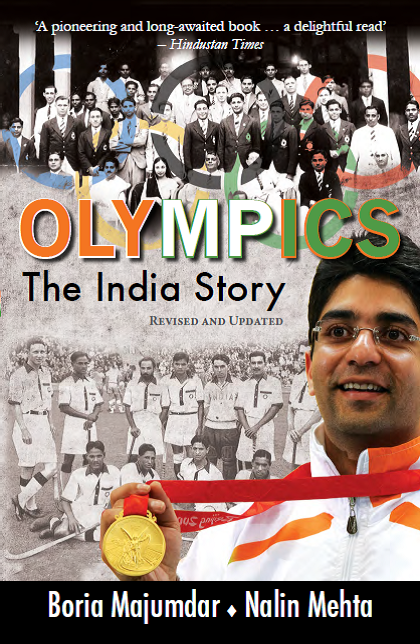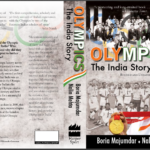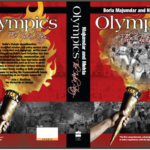Buy This Book From
‘Olympics: The India Story’ (New Delhi: HarperCollins, 2008), with Boria Majumdar. 391 pages
2nd edition, revised and updated published as ‘India and the Olympics’ (Oxford, New York: Routledge, 2010),
3rd edition, revised and updated published as Olympics: The India Story (New Delhi: HarperSports [imprint of HarperCollins], 2012.When and how did the Olympics movement take root in India? Who were the early players and why did they appropriate Olympic sport to further their political ambitions?
In most accounts of Olympic history across the world, India’s Olympics journey is a mere footnote. Olympics: The India Story sets that right. Drawing on previously unused archival sources, it demonstrates that India was an important strategic outpost in the Olympic family. It explores why the Indian elite became obsessed with the Olympic ideal at the turn of the twentieth century and how this relates to India’s quest for a meaningful role on the international stage.
First published to critical acclaim in 2008, this book has seen several reprints, and revised editions, thus bringing India’s Olympics story up-to-date.Praise for Olympics: The India Story
The first comprehensive, scholarly and yet lively account of India’s experiences with the Olympics by two of the foremost Indian scholars of sport.
— Prof. Ashis Nandy, Senior Honorary Fellow and Past Director, Centre for the Study of Developing Societies, New DelhiIndia’s Olympic exceptionalism has long mystified scholars and poly makers alike. This ably researched and engagingly written book by two distinguished Indian sport historians lays bare the persistent regionalism, communalism, and political clienteleism that have kept India mostly an Olympic backwater, even as it rose to world hegemony in cricket and other cultural domains.
— Prof. John. J. MacAloon, Director, MA Program in Social Sciences and Academic Associate Dean, Graduate Division of the Social Sciences, University of Chicago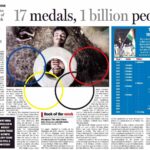 Pioneering and long awaited book….replete with little known, lively and telling details presented in an enchanting manner…[It] by virtue of its depth, dimension and erudition opens up fresh debates and numerous areas of research—besides being a delightful read.
Pioneering and long awaited book….replete with little known, lively and telling details presented in an enchanting manner…[It] by virtue of its depth, dimension and erudition opens up fresh debates and numerous areas of research—besides being a delightful read.
— The Hindustan Times, 4 Aug 2008The spread is excellent, the information marvellous, the interpretation satisfying….This book will be well-cited and, more importantly, will spring a lot more studies to give us even more insight than we have now.
— Brian Stoddart in Biblio: A Review of Books, July-Aug. 2008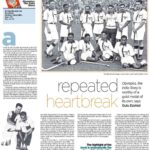 This book is a triumph of Olympic proportions for both authors and the publisher and is worthy of a gold medal on its own.
This book is a triumph of Olympic proportions for both authors and the publisher and is worthy of a gold medal on its own.
— Gulu Ezekiel in The New Indian Express, 10 Aug 2008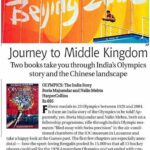 [This book]…. is of great importance to Indian sport….This work may well set the tone for more serious writing on Indian sport and what makes it so special. It is a relief to note that there are writers who can think beyond medals, but also about the stories of sportspersons.
[This book]…. is of great importance to Indian sport….This work may well set the tone for more serious writing on Indian sport and what makes it so special. It is a relief to note that there are writers who can think beyond medals, but also about the stories of sportspersons.
— The Indian Express“Meticulous research and scholarly presentation of facts and figures laced with an emotional tinge are the essential ingredients of this excellent work…Replete with information and anecdotes supported by statistics, this endeavour by the two authors fulfils the need for an authentic document about the history and growth of Olympism in India”
– The Hindu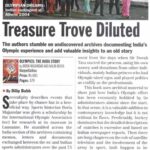 The first detailed history of India’s Olympic experience. This is the first time that documented history has been used to tell the India Olympic story, one of sordid, self-serving politics, egos, power equations and regionalism…..it is a valuable addition to contemporary knowledge.
The first detailed history of India’s Olympic experience. This is the first time that documented history has been used to tell the India Olympic story, one of sordid, self-serving politics, egos, power equations and regionalism…..it is a valuable addition to contemporary knowledge.
— India Today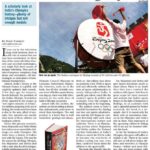 Majumdar and Mehta will give sports historians much to cheer about…As an academic work and a splendid primer for further research, the book is a triumph.
Majumdar and Mehta will give sports historians much to cheer about…As an academic work and a splendid primer for further research, the book is a triumph.
— Mint, 8 Aug 2008 An eloquent narration laced with rare anecdotes that makes it immensely readable…The wealth of previously unused archival sources is the strength of the book. Laudable for having picked up a subject hitherto untouched, the book proves that you have to study social histories of sport as a whole rather than as a history of cricket, football or Olympics.
An eloquent narration laced with rare anecdotes that makes it immensely readable…The wealth of previously unused archival sources is the strength of the book. Laudable for having picked up a subject hitherto untouched, the book proves that you have to study social histories of sport as a whole rather than as a history of cricket, football or Olympics.
–-The Hindu (second review article on the book)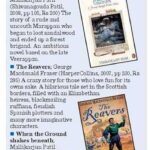 This book by two well-known Indian sport historians is a comprehensive documentation of India’s experiences in the Olympics and also explores the complex role that regional and national identities play in it.
This book by two well-known Indian sport historians is a comprehensive documentation of India’s experiences in the Olympics and also explores the complex role that regional and national identities play in it.
— The Deccan Herald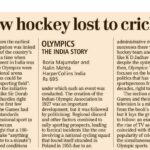 It adds up to a well-produced holistic account of India at the Games.
It adds up to a well-produced holistic account of India at the Games.
— Business Standard, 1 Aug 2008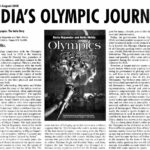 The authors have aptly summed up a few of the ills that trouble our Olympians…A readable account which should wake up every Indian with some interest in sport.
The authors have aptly summed up a few of the ills that trouble our Olympians…A readable account which should wake up every Indian with some interest in sport.
— The Tribune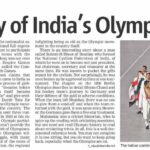 A well researched effort, the book brings out some astounding details of Indian sport, its origins, the politics, passion and sacrifices.
A well researched effort, the book brings out some astounding details of Indian sport, its origins, the politics, passion and sacrifices.
–- DNA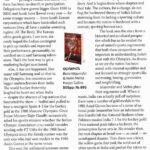 The book sees the story from a historical and cultural perspective which has so far evaded the eye of the nation’s sporting cognoscenti….Majumdar and Mehta place their arguments well.
The book sees the story from a historical and cultural perspective which has so far evaded the eye of the nation’s sporting cognoscenti….Majumdar and Mehta place their arguments well.
— TehelkaMajumdar and Mehta’s narrative is as much about the Olympics’ place in India as it is about India’s place in the Olympics….The content alone earns the book its place on any sports fan’s bookshelf.
— Business WorldOlympics is a work of serious cultural history in which, at every turn, political and social themes are explored and interwoven with discussion of sporting matters. As such, it is no overstatement to say that, in addition to their titular subject matter, the authors make an important contribution to the study of Indian history. Sport, as a significant social institution in India, offers a telling point of connection with broader social and political events in the country (both pre- and post-Independence). It is to the credit of Majumdar and Mehta that they are successful in clarifying this connection…. [It] is written in a highly accessible style, and will be of interest to those keen to understand the evolving relationship between colonialism and postcolonialism in the Subcontinent. Indeed, by the end of the book, one ends up asking how the history of this relationship could be meaningfully traced without the type of articulation of sporting themes that Majumdar and Mehta provide.
— John Hughson in Himal, Oct 2008
